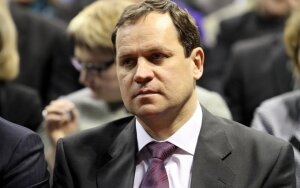- March 29, 2013
- 445
Tomaszewski: This can be considered as an attempt to fight with schools for national minorities

Religion classes are required in order to oppose very different values to the cynicism of a liberal society, said in an interview for “Coffee Nedelia” Waldemar Tomaszewski, the leader of AWPL and a MEP. A preferential treatment at this year’s state language exam is a temporary solution, added the politician.
“The party program contains a decision corresponding to the demands of the representatives of the Russian and Polish schools to return to the previous version of the Law on Education, which was valid for more than 20 years of independence, and did not disturb anybody” – thus Tomaszewski commented on the situation in the education sector.
”I think this can be considered as an attempt to fight with schools for national minorities. And the talks about the discrimination of Lithuanian students are all on the verge of absurdity. The graduates of Polish and Russian schools take one more exam compared to graduates of the Lithuanian schools – they write an additional essay in their mother tongue (…) for example, the Lithuanian language teachers in schools for minority know that students in these schools have 732 (!) less Lithuanian language lessons in their schools than in Lithuanian” – explained the view on this issue the AWPL party leader.
The cynicism of the liberal society and religion classes
According to Tomaszewski, religion classes are conducted in many countries of the European Union. AWPL do not want to introduce the lessons of faith, but religion. “This course should help the child to facilitate the visualization of the world order basis, eternal values, to sow the seed of spirituality in him, to explain the concepts of good and evil. This means that we want to oppose the callousness, immorality, freedom of morals, cynicism of liberal society to very different values, which could be reminded by this subject in school. In these classes the students would get an idea of the basics of different religions, their history” – explained Tomaszewski. “And besides, we did not offer anything that was not in other EU countries. In most European countries, religion classes are placed in the basket of compulsory subjects along with other subjects. In Germany, for example, the Constitution guarantees religious education as an ordinary school subject. We are pleased with the fact that in Polish schools in Lithuania 100 percent of the students are taught religion” – added MEP.
The abortion is the killing of life
Tomaszewski is convinced that the struggle for the rights of unborn children is also a fight for the value of human life and its defense from conception to natural death. “Canonical rules equate abortion with murder, after all, the conception of man is a gift from God. No matter how much our opponents tried to convince us that the embryo is just a part of the female body, which she may dispose at its own discretion, the fact remains that the abortion is killing a life that begins in the prenatal stage. It is no wonder that women after abortion inevitably experience depression, doctors even called it “the post-abortion syndrome”. One would have to ask the ones who fought for the right of their own body: if they do not mind the fact that in half of the cases this part of the body – it is the embryo of the opposite sex (boys are also born) and in most cases they have a different blood type?” – emphasized the leader of AWPL.
”In 2005, when we were discussing a similar project, the public became interested in this little-known subject, and now the statistics show that last year two times less unborn children are killed than 8 years ago, but today that number still is shocking: the abortion claimed about 8 thousands of lives. As you can see, the initiative of AWPL, even not crowned with victory, helped to significantly reduce the number of abortions” – Waldemar Tomaszewski is convinced.
Source: http://pl.delfi.lt/aktualia/litwa/rektor-uw-ulgi-na-egzaminie-dyskryminuja-uczniow.d?id=60969185
Tłumaczenie Agnieszka Wiecheć w ramach praktyk w Europejskiej Fundacji Praw Człowieka, www.efhr.eu. Translated by Agnieszka Wiecheć within the framework of a traineeship programme of the European Foundation of Human Rights, www.efhr.eu.

